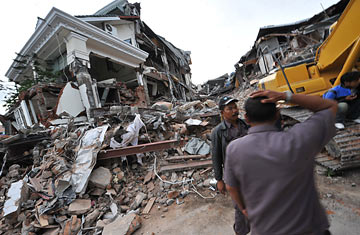
Rescue teams look for victims in a collapsed hotel in earthquake-devastated Pariaman, Indonesia.
It has been two days since an earthquake struck the Indonesian island of Sumatra on Sept. 30, killing upwards of 1,100, according to the last U.N. estimate. But small signs of life are returning to the villages surrounding the town of Pariaman, where at least 234 people have been confirmed killed and another 400 are missing and presumed dead. Boys are using makeshift rackets to play badminton amid the wreckage of houses with walls peeled away or roofs pitched at impossible angles. In one community around 20 km (12.4 miles) from the quake's epicenter, a local entertainer gathered an audience by kerosene light for an impromptu magic show. For the first time in days, says local resident Taufik, people were relaxed enough to laugh for a few minutes.
But just a few kilometers away, in the village of Tandikat, at the foot of a dormant volcano, an eerie silence prevailed. Four local communities were essentially wiped out when the tremor triggered landslides, covering a 20 hectare (500 acre) swathe with up to 10 m (30 feet) of earth. In one community, at least 40 people, mostly children, perished as they sat at an outdoor kiosk watching television before attending a Koranic class. On Friday alone, 12 bodies, or parts of bodies, were discovered by a search-and-rescue team from the Indonesian Special Police. One man identified a leg as his brother's. Another recognized his wife's torso. No other parts of their bodies were found.
Amin Dullah, 40, a fishmonger, crouched in a tent with around 40 other survivors. His five-year-old daughter Tia Leni Augustina sat in his lap, but his son wasn't there. When the quake struck, Amin ran from his house with his boy named Fajar. Almost immediately, he was inundated by a wave of earth from the landslide. Amin kept hold of his son and clawed his way out, thinking he was safe. After running around 200 m (about 600 feet), he was knocked back by another torrent of soil and lost his grip on Fajar. On Friday, his two-year-old son's body was found by the riverbank. "I thank God it was in one piece," says Amin. Now, he's searching for the bodies of his parents-in-law, who didn't make it out of his house. The building itself has completely disappeared under a mountain of dirt. Of Amin's 31 neighbors, only six survived.
Gathered in a remote area called Pulau Koto, the ex-residents of Tandikat huddled in a tent and had no idea that the tragedy that befell them extended far beyond their once-placid rice paddies and cacao fields. Learning that hundreds had died in the city of Padang, a two-hour drive away, Amin hugged his daughter in his arms. "Compared to many people, I am lucky," he says. "At least I have someone left."
At the emergency headquarters in Pariaman, regency secretary Yuen Karnova says that at least 10,068 buildings in the area have either collapsed or are so heavily damaged that they are condemned. Pariaman, he notes, is located astride one of the world's most active fault-lines. "Every natural disaster you can think of, it has happened here," he says. "Landslides, floods, volcano eruptions, earthquakes, even a tsunami. Some people ask me, why don't you leave? But we are people of faith, and we must face up to these challenges."
Wednesday's earthquake, though, is by far the largest test Yuen's generation has faced. With no heavy machinery to pull out the bodies, emergency teams have had no choice but to scrabble through the rubble and dirt with shovels or their bare hands. Some have blisters and bloodstains on their palms from the rescue effort. Dr. Rahmat Fajar traveled from south Sumatra to administer to trauma victims, but so far no one has been pulled out alive from the landslide area. "We are still digging," he says. "But we have no hope. None at all." Just then, at nearly 9 p.m., a local walks up to the medic team and announces that another body has been found by the riverbank. The survivors in the tents jostle and wonder who will claim this corpse. Tomorrow there will surely be others.
